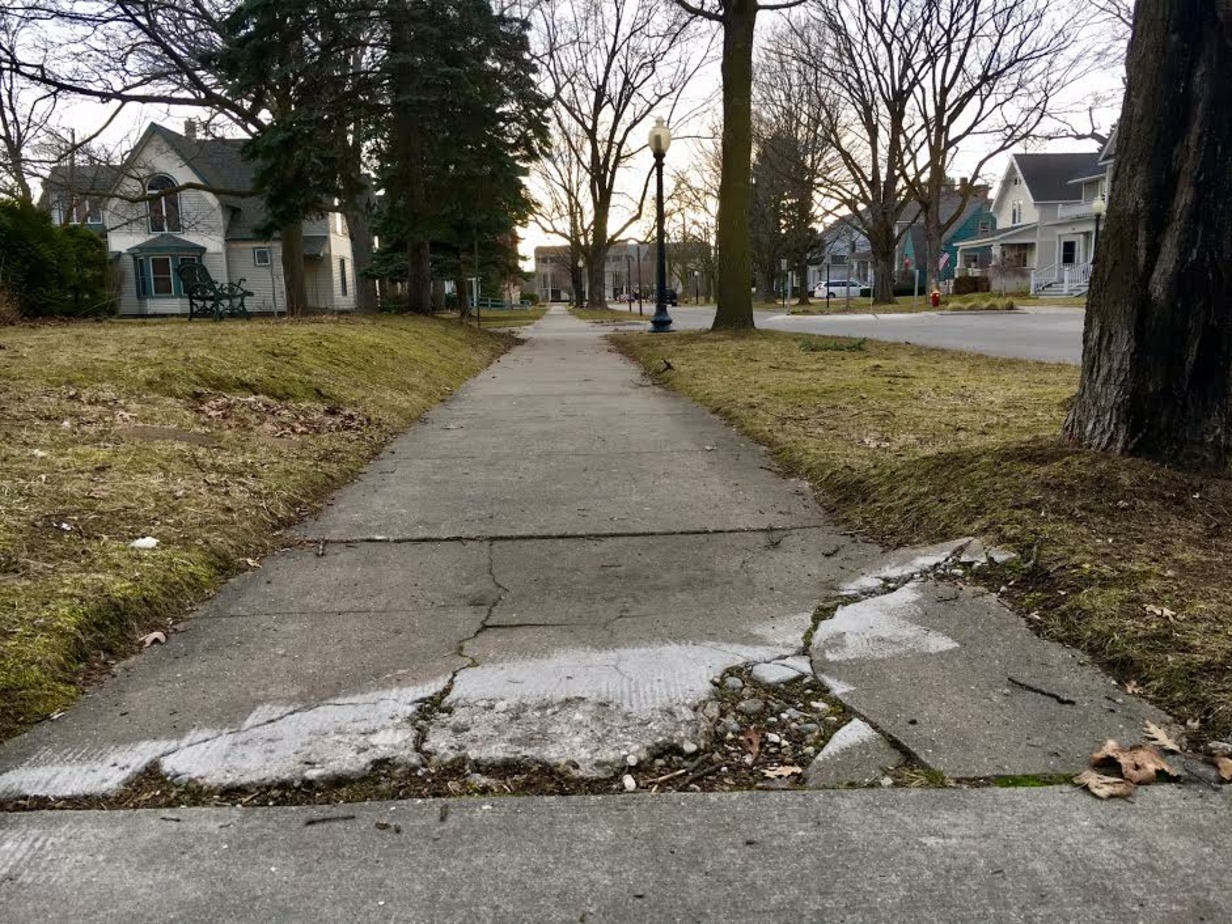
City To Make Key Decision On Sidewalk Bonding
By Beth Milligan | Sept. 15, 2018
After more than a year-and-a-half of discussions, Traverse City commissioners are set to finally vote Monday on whether to bond a $4.5 million citywide sidewalk project – a motion that’s potentially vulnerable to failure, with only six commissioners sitting on the board and five votes needed to pass.
City Manager Marty Colburn is seeking commission approval to proceed with issuing up to $7.8 million in city bonds: $4.5 million for the citywide sidewalk project and $3.2 million for the completion of the Boardman Lake Trail, plus fees and interest. Commissioners have discussed the sidewalk project since at least April 2017, expressing their support for a plan to complete over 115,000 feet of needed sidewalk gap infill and repairs throughout the city in just a few years’ time, rather than over a decade or more.
The project also calls for constructing nearly 70,000 feet of new sidewalk in the city – including adding more than 48,000 feet of sidewalk to Traverse Heights neighborhood – and repairing 15,000 feet of sidewalk rated as being in "poor" or "very poor" condition. City crews have already started work on that last component of the project: Commissioners approved a $915,000 contract with Elmer’s in April to fix the city’s worst sidewalks over the 2018 and 2019 construction seasons. The city took out a loan from its own economic development fund to pay for the project, with the expectation the loan would be repaid internally once the sidewalk project bonds were issued.
But while a majority of commissioners have expressed support for bonding throughout the 18-month review process, some – including Commissioners Richard Lewis and Brian McGillivary – have questioned aspects of the sidewalk project in recent months, including bonding. McGillivary opposed the April motion to support the Elmer’s contract for sidewalk repairs, while Lewis has repeatedly questioned whether bonding is the city's best option. At a September 4 meeting, Lewis said the city should consider the possibility of using the funds that would go toward an annual bond payment and instead pay out-of-pocket for sidewalk improvements on a year-to-year basis.
“The issue is do we want to do (sidewalk improvements) in a three-year period, or…put the same amount of money that we’d be paying bonds on (and spread the funding out) over a 15-year period and probably accomplish more,” Lewis said. “Until we adopt the resolution to issue bonds, it’s still an open question.”
A ‘no’ vote from both Lewis and McGillivary would be enough to sink the bond motion Monday. Commissioner Brian Haas resigned from the board in August, leaving a vacancy that will be filled through a public appointment process later this month. With Haas gone, bonding will require support from five of the remaining six commissioners on the board in order to be approved.
According to a memo from Colburn, members of the public can also potentially block bonding by circulating a petition asking for a public referendum to be held on whether to issue bonds. The deadline for a petition to be filed for the sidewalk bonds has already passed; however, the deadline for a petition to be filed for the Boardman Lake bonds is not until September 24. Colburn is seeking approval from the board Monday to issue the bonds on September 25 as soon as the final deadline has passed, allowing the city to lock in interest rates before an expected upcoming increase by the Federal Reserve.
Commissioners Monday will also consider approving a policy outlining how funds from a recent citywide tax hike will be spent on sidewalk and street repairs. The tax increase, approved by the board in June, raised the city’s millage rate by 1 mill from 11.1167 to 12.1167 – a move expected to generate approximately $867,000 in additional revenue its first year. The proposed policy for spending those funds lists as a “first priority” either paying the annual bond payment for the citywide sidewalk project, or if a bond fails, allocating an equal amount to annual sidewalk improvements. “The second priority shall be to provide and allocate funds from the additional millage rate toward the completion of the Eighth Street project, and thereafter, to street improvements” outlined in the city’s capital improvement plan, according to the proposed policy.
Also at Monday’s meeting…
> Commissioners will consider approving a $479,515 contract with Gourdie Fraser for engineering services for the reconstruction of Eighth Street. The firm was one of five that bid for the project and came in the middle of the pack pricing-wise, with bids ranging from $309,970 to $717,375. Though Gourdie Fraser wasn’t the cheapest option, City Engineer Tim Lodge recommended the firm because representatives attended city study sessions about the Eighth Street project and demonstrated in their bid materials they understood the complicated project scope, including the need to plan for driveway closures along Eighth Street. “Thus, we confirmed that the work plan from (Gourdie Fraser) best fit the project needs,” says Lodge.
> Commissioners will also consider approving the 2018-19 ski rates for Hickory Hills Ski Area, which feature a slight increase over 2017-18 rates. Most season pass rates will increase by $4-5 this year, while daily pass rates will increase by $1. Due to widespread trail improvements in the park, cross-country ski rates are set to increase the most: increasing from $6 to $10 for city residents and from $7 to $15 for non-city residents for daily passes, with a family cross-country season pass eliminated in favor of an individual cross-country season pass costing $50 for city residents and $70 for non-city residents (the previous cost of the family pass).







